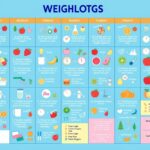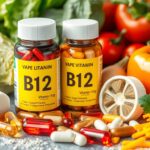Vitamin B12-Exploring the Risks and Potential Benefits,Vitamin B12 is key for good health. It helps with many body functions. We’ll look at the risks and benefits of vitamin B12 and how a lack can harm your health. Knowing about vitamin B12 helps you choose the right foods and supplements.
Table of Contents
We’ll cover where to find vitamin B12, its important roles, signs of a lack, and safe ways to take supplements.
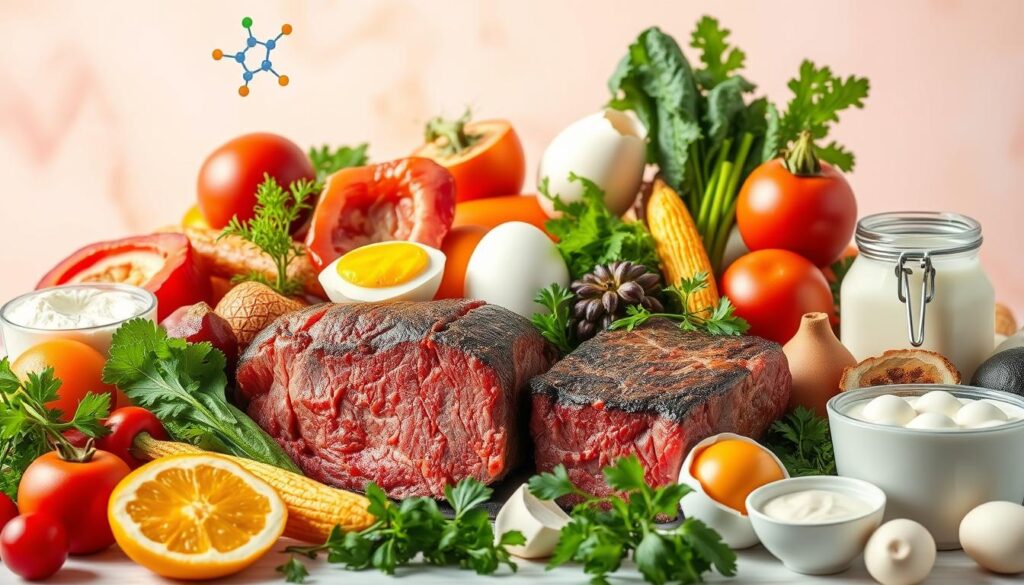
Key Takeaways
- Vitamin B12 is vital for health and well-being.
- A lack of vitamin B12 can cause serious health problems.
- Knowing the risks and benefits of vitamin B12 is important for nutrition.
- Eating the right foods and supplements can keep levels up.
- Spotting vitamin B12 deficiency signs early can help.
- Safe supplement practices ensure you get the right amount.
Understanding Vitamin B12
Vitamin B12 is key for many body functions. It helps make red blood cells, keeps the nervous system working right, and is needed for DNA. Knowing about vitamin B12 helps us see why it’s so important for our health. It comes in types like methylcobalamin and cyanocobalamin, with cyanocobalamin being common in supplements.Vitamin B12-Exploring the Risks and Potential Benefits
What is Vitamin B12?
Vitamin B12 is a must-have nutrient. It helps make red blood cells and keeps the nervous system running smoothly. Not getting enough can cause health problems. Luckily, we can get it from food or supplements because our bodies can’t make it.Vitamin B12-Exploring the Risks and Potential Benefits
Sources of Vitamin B12
Animal products are the top sources of vitamin B12. The best foods for it are:
- Meat (like liver and kidney)
- Fish (such as salmon and trout)
- Dairy (milk, cheese, yogurts)
- Eggs
Vegetarians and vegans can find it in fortified cereals and plant-based milks. Knowing where to find vitamin B12 helps keep it in your body.
| Food Source | Vitamin B12 Content (µg per 100g) |
|---|---|
| Beef Liver | 70.7 |
| Fish (Salmon) | 4.9 |
| Milk | 0.5 |
| Eggs | 1.1 |
| Fortified Cereal | 6.0 |
Why You Need Vitamin B12
Vitamin B12 is key for your health. It helps with energy and keeps your nervous system healthy. We’ll look at what it does and how much you need at different ages.
Essential Functions of Vitamin B12
Vitamin B12 does more than just provide nutrition. It helps make DNA and red blood cells, preventing anemia. It also helps make neurotransmitters, which are important for your mood and thinking.
Not getting enough can cause problems with your nerves and mind. So, it’s important to eat enough vitamin B12.
Daily Recommended Intake
The amount of vitamin B12 you need changes with age and health. Here’s a basic guide:
| Age Group | Recommended Intake (micrograms/day) |
|---|---|
| Infants (0-6 months) | 0.4 |
| Children (1-3 years) | 0.9 |
| Children (4-8 years) | 1.2 |
| Adults | 2.4 |
| Pregnant Women | 2.6 |
| Breastfeeding Women | 2.8 |
These amounts help you meet your vitamin B12 needs. It’s very important for pregnant and breastfeeding women to get enough. It helps them stay healthy and support their babies.
Why Vitamin B12 Risks and Benefits Matter
Vitamin B12 is more than just a nutrient. The risks of vitamin B12 deficiency can cause serious health problems. On the other hand, having enough vitamin B12 offers many benefits.
Potential Risks of Vitamin B12 Deficiency
Vitamin B12 deficiency can show up in many ways, affecting your health. Some common signs include:
- Fatigue and weakness
- Memory loss or cognitive difficulties
- Nerve damage, causing numbness or tingling
- An increased risk of anemia
Long-term lack of vitamin B12 can lead to serious issues. These include heart problems and neurological disorders. It’s important to know these symptoms to manage and prevent them.
Health Benefits of Adequate Vitamin B12
Having enough vitamin B12 can greatly improve your health. The benefits include:
- Improved mood and reduction in depressive symptoms
- Enhanced cognitive function, including better memory and clarity
- Stronger heart health by supporting blood cell formation
Knowing the health benefits of vitamin B12 shows its key role in your daily health. By focusing on vitamin B12, you can live a more vibrant and healthy life.
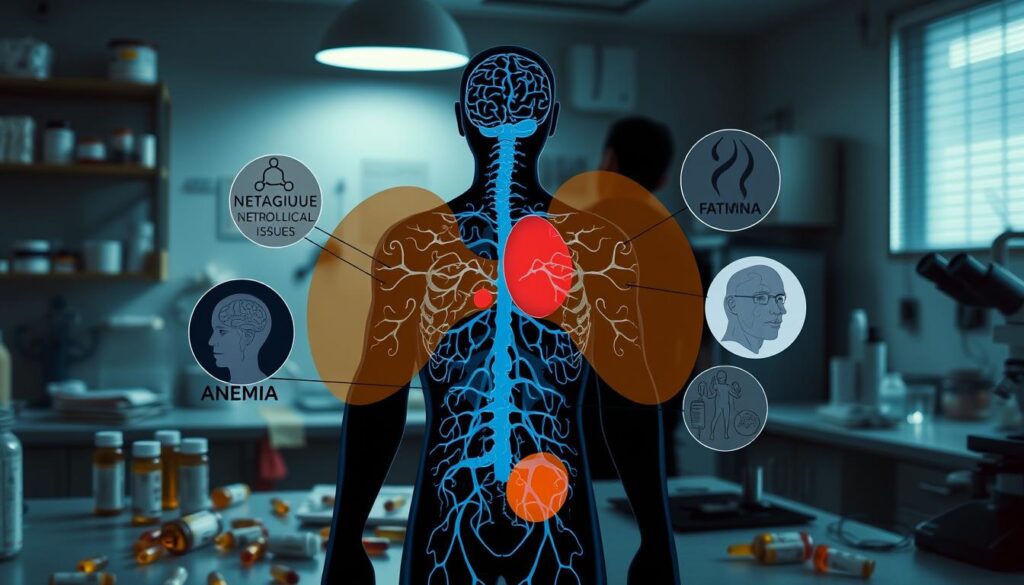
| Risks of Deficiency | Health Benefits |
|---|---|
| Fatigue | Increased energy levels |
| Memory loss | Enhanced cognitive abilities |
| Nerve damage | Improved nerve function |
| Anemia | Better blood health |
Signs of Vitamin B12 Deficiency
It’s important to know the signs of vitamin B12 deficiency for your health. Many people ignore symptoms that can lead to serious problems. Look out for weakness, tingling in hands and feet, pale skin, and trouble thinking clearly. Spotting these signs early can help you get the right care.
Common Symptoms to Watch For
The signs of a B12 deficiency can be different for everyone. Here are some key signs to watch:
- Fatigue: Feeling very tired and lacking energy.
- Pale or jaundiced skin: Skin that looks yellow or pale.
- Tingling or numbness: Feeling strange sensations in your hands and feet.
- Cognitive changes: Trouble remembering things, feeling confused, or having trouble focusing.
- Dizziness: Feeling like you’re spinning or losing your balance.
Testing for Vitamin B12 Levels
Testing your vitamin B12 levels is key to knowing if you’re deficient. Blood tests are a simple way to check your B12 levels. They help you understand your health. If you notice any signs of a B12 deficiency, get tested early. Here’s a quick guide to common tests:
| Test Method | Purpose | Comments |
|---|---|---|
| Serum B12 Test | Measures the amount of B12 in your blood. | Common initial test for deficiency. |
| Methylmalonic Acid (MMA) Test | Assesses metabolic byproducts related to B12. | More specific indicator of deficiency. |
| Homocysteine Level Test | Evaluates amino acid levels affected by B12. | Can indicate deficiency even if B12 levels are normal. |

Safe Supplementation Practices
It’s important to know how to safely take vitamin B12 supplements. There are many types of supplements to choose from. Knowing the right dosage is key, as it depends on your age, diet, and health needs. Always talk to a doctor before starting any supplement to make sure it’s right for you.
Forms of Vitamin B12 Supplements
Vitamin B12 supplements come in different forms. Each has its own benefits. Here are some common ones:
- Sublingual Tablets: These dissolve under the tongue, allowing quick absorption into the blood.
- Injections: Given in clinics, injections are best for severe deficiencies.
- Sprays: Easy to use, sprays are a good option for those who don’t like pills.
- Capsules: Capsules are popular and come in many types.
Recommended Dosages and Guidelines
Finding the right amount of vitamin B12 is key. Here are some guidelines based on your age and health:
| Age Group | Recommended Dosage (mcg) | Notes |
|---|---|---|
| Children (1-3 years) | 0.9 | Lower dosage due to smaller size and dietary needs. |
| Adults | 2.4 | Typically recommended for general maintenance. |
| Pregnant Women | 2.6 | Increased needs during pregnancy. |
| Vegetarians/Vegans | 2.4-100 | Higher doses may be necessary for those who avoid animal products. |
| Individuals with Deficiency | Up to 1000 | Consultation with a healthcare provider is vital for this group. |
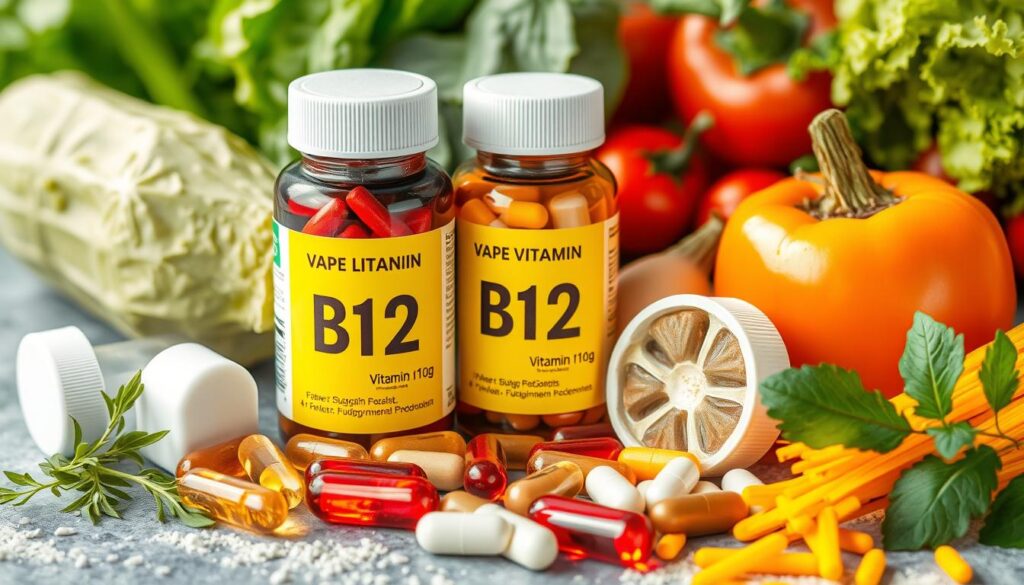
Dietary Considerations
It’s important to know where to find vitamin B12, which is key for vegetarians and vegans. Vitamin B12 is mostly in animal products. So, finding other ways to get it is a must. Knowing how certain medicines affect B12 levels can also help with food choices.Vitamin B12-Exploring the Risks and Potential Benefits
Vegetarian and Vegan Sources of Vitamin B12
Vegetarians can get B12 from eggs and dairy. Vegans, on the other hand, need fortified foods. Here are some vegan sources:
- Fortified plant-based milks (such as almond, soy, or oat milk)
- Nutritional yeast
- Fortified cereals
- Fortified meat substitutes
Eating these fortified foods can keep your B12 levels up. If you can’t get enough from food, think about taking supplements.
Impact of Medications on Vitamin B12 Levels
Some medicines can mess with how your body absorbs and uses B12. Knowing which medicines affect B12 is important. This includes:
- Proton pump inhibitors (PPIs) used for acid reflux
- Metformin for diabetes
- Some anticonvulsants
- Antibiotics
If you’re on these meds, check your B12 levels often. Talk to a doctor about your diet and supplements to stay healthy.
| Food Source | Type | Vitamin B12 Content (mcg) |
|---|---|---|
| Fortified Almond Milk | Vegan | 1.5 |
| Nutritional Yeast | Vegan | 4.0 |
| Fortified Soy Milk | Vegan | 2.0 |
| Fortified Breakfast Cereal | Vegan | 6.0 |
| Eggs | Vegetarian | 1.1 |
| Dairy Products | Vegetarian | 0.9 |
Conclusion
This vitamin B12 overview shows how important it is for your health. Vitamin B12 helps your nerves and makes red blood cells. Not having enough can cause serious problems, so it’s key to know about it.
If you eat plants a lot, you might need more vitamin B12. The health risks and benefits of vitamin B12 show why it’s good to know about it. It helps you live better and feel better too.
Knowing about vitamin B12 helps you take care of your health better. By choosing the right foods and maybe taking supplements, you can enjoy its benefits. This way, you can stay healthy and feel great.
FAQ
What is vitamin B12, and why is it important?
Vitamin B12 is a water-soluble vitamin. It’s key for making red blood cells, keeping your nerves healthy, and helping with DNA. Knowing its role is vital for your health.
What are the primary sources of vitamin B12?
You can find vitamin B12 in animal products like meat, fish, and dairy. Vegans and vegetarians can get it from fortified cereals and plant-based milks.Vitamin B12-Exploring the Risks and Potential Benefits
How can I determine if I have a vitamin B12 deficiency?
Signs of a deficiency include feeling tired, weak, and pale. You might also feel tingling or have trouble thinking clearly. Blood tests can check your levels.Vitamin B12-Exploring the Risks and Potential Benefits
What are the recommended daily intakes of vitamin B12 for different age groups?
The amount you need changes with age. Adults need about 2.4 micrograms daily. Pregnant and breastfeeding women need more. Kids need less, based on their age.
What are the risks associated with vitamin B12 deficiency?
Not having enough B12 can lead to memory loss, feeling very tired, nerve damage, and anemia. Catching these signs early is key to avoiding serious problems.Vitamin B12-Exploring the Risks and Potential Benefits
How can vitamin B12 supplements help?
Supplements can help if you’re not getting enough B12. There are different types, like tablets, injections, and sprays. Always talk to a doctor to find the right one for you.Vitamin B12-Exploring the Risks and Potential Benefits
Are there any dietary considerations for vegetarians and vegans regarding vitamin B12?
Yes, vegetarians and vegans might struggle to get enough B12. It’s mainly in animal products. Eating fortified foods or taking supplements is important to avoid deficiency.Vitamin B12-Exploring the Risks and Potential Benefits
Can medications affect my vitamin B12 levels?
Some medicines can stop your body from absorbing B12. This is why it’s important to check your levels if you’re on certain treatments. Always talk to your doctor about any concerns.Vitamin B12-Exploring the Risks and Potential Benefits

